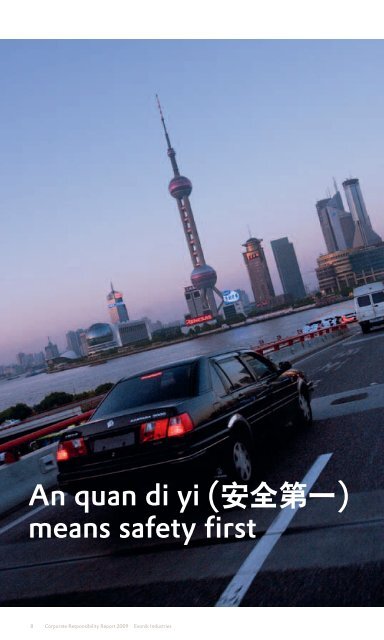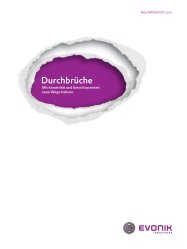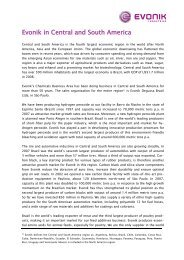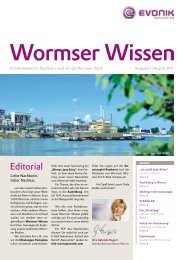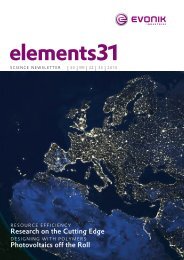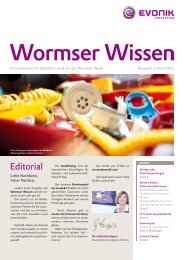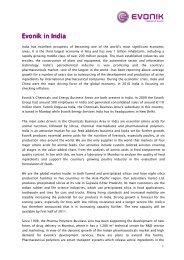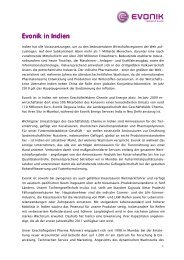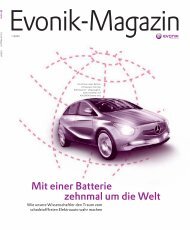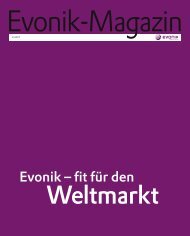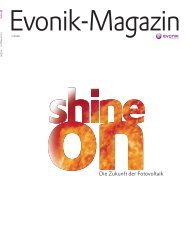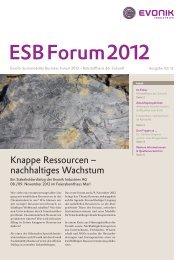MATCH - Evonik Industries
MATCH - Evonik Industries
MATCH - Evonik Industries
You also want an ePaper? Increase the reach of your titles
YUMPU automatically turns print PDFs into web optimized ePapers that Google loves.
An quan di yi (安全第一)<br />
means safety first<br />
8<br />
Corporate Responsibility Report 2009 <strong>Evonik</strong> <strong>Industries</strong>
SucceSS StorieS<br />
cr Strategy cr Performance annex<br />
Gridlock on the A4 highway. The chaotic traffic on the bridge over the<br />
Huang Pu river often jams for no apparent reason—even though we are<br />
heading out of the city. Our destination is <strong>Evonik</strong>’s Multi User Site China<br />
(MUSC) about 40 kilometers south of Shanghai.<br />
Here, on the edge of Hangzhou Bay, is <strong>Evonik</strong>’s<br />
<strong>MATCH</strong> complex. <strong>MATCH</strong> stands for Methacrylates<br />
to China and this integrated production<br />
facility is the latest step in the company’s strategic<br />
drive in Asia. Completed in record time,<br />
this is a busy world-scale chemicals production<br />
site built on what used to be a marshy polder<br />
area. When we arrive, it is just like being at any<br />
of <strong>Evonik</strong>’s other sites—for example, in Germany,<br />
Belgium or the United States. We are<br />
greeted by a security check. Have you got an<br />
appointment? Please show us identification. Are<br />
you familiar with our safety regulations? Same<br />
procedure as everywhere.<br />
<strong>Evonik</strong> has had a presence in China for about<br />
80 years. Initially in Shanghai, the economic hub<br />
that formed a bridgehead to the rest of the<br />
country. The company’s business links with<br />
China go back to the 1930s when it was involved<br />
in a range of trading activities. When the country<br />
began to emerge as a global economic power<br />
in the late 20th century, <strong>Evonik</strong> stepped up its<br />
presence there. The <strong>MATCH</strong> integrated production<br />
complex, the biggest facility at MUSC<br />
and the second biggest single investment of<br />
<strong>Evonik</strong>’s Chemicals Business Area is the culmination<br />
of this strategy. <strong>MATCH</strong> has a capacity<br />
of 100,000 metric tons a year and produces a<br />
wide range of methacrylate-based starting<br />
products for key Chinese industries.<br />
A milestone was achieved shortly before our<br />
visit: the first routine maintenance shutdown.<br />
That is no easy task at such a complex facility.<br />
Some 3,000 separate steps had to be carried out,<br />
including draining all substances, emptying every<br />
pipe and checking every space for residues<br />
prior to cleaning and restarting the facility.<br />
“More than 500 people—employees and externals—were<br />
involved, sometimes working in parallel,<br />
sometimes one above the other, without<br />
a single accident,” reports production manager<br />
Dr. Wilfried Schmidt, not without pride. He<br />
knows that this excellent track record is a result<br />
of thorough preparation. “We started planning<br />
the shutdown before parts of the facility had<br />
started operating.” <strong>Evonik</strong>’s safety philosophy<br />
also played a part according to site manager Dr.<br />
Jinqiu Chen: “A meeting was held for all employees<br />
at seven o’clock every morning. A pep<br />
talk and safety reminders marked the start of<br />
every day during the project.” And that paid off:<br />
no accidents were recorded and the overhaul<br />
was completed on schedule.<br />
A bridge between <strong>Evonik</strong>’s standards<br />
and local requirements.<br />
“Being close to the market—following growth”<br />
is <strong>Evonik</strong>’s motto. The decision to build an integrated<br />
production facility for methacrylates<br />
back in 2007 was therefore a logical step. The<br />
challenge was to bridge the gap between local<br />
requirements, and upholding <strong>Evonik</strong>’s standards.<br />
The safety precautions at the facility<br />
make it quite clear that <strong>Evonik</strong> has succeeded in<br />
ensuring that its in-house standards are met.<br />
Everything is practiced dozens—if necessary<br />
hundreds—of times: from wearing personal protective<br />
equipment such as helmets and goggles<br />
to routine procedures and repairs. Every step is<br />
carefully defined and set out in checklists. And<br />
the safety standards are paying off: ▸ ▸ ▸<br />
Corporate Responsibility Report 2009 <strong>Evonik</strong> <strong>Industries</strong> 9
10<br />
▸ ▸ ▸<br />
Construction of this massive facility was<br />
completed without a single reportable accident.<br />
About 7.5 million accident-free working hours,<br />
without a single day’s work lost. Even in Germany<br />
that is not always the case.<br />
This success is partly due to a clever system<br />
of incentives for accident-free working practices<br />
that emphasize the importance of responsibility.<br />
An accident-free track record in all<br />
plants simultaneously is needed to score 150 bonus<br />
points. Moreover, that includes contractors<br />
working on site. The result is that everyone<br />
keeps an eye on the safety of others and employees<br />
ensure that external contractors do not<br />
work without protective goggles and gloves and<br />
that procedures are followed exactly. Safety is<br />
taken seriously by everyone.<br />
Keep on striving to do more and<br />
do it better is the motto for employees’<br />
day-to-day work.<br />
Even so, <strong>Evonik</strong>’s track record in China is not<br />
entirely unblemished. In 2009 two staff employed<br />
by a contractor died when a wastewater<br />
storage tank exploded in Dalian. That was reason<br />
enough to pay even more attention to observing<br />
safety precautions. The morning meeting<br />
held for plant managers in Shanghai shows<br />
that the “safety first” principle enshrined in<br />
<strong>Evonik</strong>’s strict Environment, Health & Safety<br />
philosophy really is taken seriously. Safety news<br />
is the first item on the agenda at every meeting.<br />
Almost everyone present today is Chinese. The<br />
plant was initially co-supervised by experts<br />
from <strong>Evonik</strong> in Germany but handover to the<br />
160-member team of Chinese operatives has<br />
now started.<br />
No cost or effort was spared in preparing the<br />
new teams for their jobs. That included training<br />
at other plants in China, Japan and, above all,<br />
Germany. Prior to start-up of the new complex,<br />
managers and key specialists divided their time<br />
between China and Germany to gain an insight<br />
into the various different sites and processes.<br />
Corporate Responsibility Report 2009 <strong>Evonik</strong> <strong>Industries</strong><br />
Some had previously worked for <strong>Evonik</strong> in Germany.<br />
Chen is one example. He studied German<br />
in Shanghai, then chemistry in Germany before<br />
working in research at <strong>Evonik</strong>’s sites in Marl,<br />
Germany. The members of the team therefore<br />
combine familiarity with Chinese customs with<br />
an awareness of <strong>Evonik</strong>’s standards. As well as<br />
understanding the Shanghai dialect, they have<br />
a clear understanding of German regulations<br />
and international employment and plant safety<br />
standards.<br />
In China, as in other countries, regulations<br />
and official thresholds are becoming more and<br />
more important. For instance, the government<br />
is determined to get air pollution under control.<br />
Last year it passed strict laws on environmental<br />
protection, and Chinese regulations on exhaust<br />
gas emissions from industrial facilities are now<br />
among the toughest in the world. The same goes<br />
for occupational safety, where China no longer<br />
wishes to lag behind other countries. Some of<br />
the laws on such matters have been in force for<br />
a long time. The state is becoming increasingly<br />
tough with the perpetrators of environmental<br />
damage and publicly condemns irresponsible<br />
employers. Pan Yue, China’s deputy environment<br />
minister: “We no longer seem to be able<br />
to get our environmental problems under control<br />
by using conventional administrative methods<br />
and regulatory tools. In the past, I was proud<br />
to describe China as the world’s workbench.<br />
Today I’m concerned to prevent it becoming the<br />
world’s refuse tip.”<br />
<strong>Evonik</strong> is currently conducting a China-wide<br />
survey to find out how firmly statutory requirements,<br />
threshold limits and standards are anchored<br />
in its processes and in employees’ minds.<br />
Fourteen audits are being conducted to check<br />
compliance with EHS regulations at all <strong>Evonik</strong><br />
facilities in China. <strong>MATCH</strong> will be audited in<br />
July 2010. Does the facility meet all official requirements?<br />
Does it apply <strong>Evonik</strong>’s standards?<br />
Are the processes fine or could they be optimized<br />
further? These are just some of the questions<br />
that experienced personnel from <strong>Evonik</strong>’s<br />
sites around the world will be examining over
SucceSS StorieS<br />
a period of several days. Chen is relaxed. After<br />
all, he often receives visits from officials. For<br />
example, the week after our visit controllers<br />
from Beijing were expected at the site to check<br />
on the implementation of ESH standards.<br />
cr Strategy cr Performance annex<br />
<strong>Evonik</strong> received three awards as a model<br />
employer in 2009 alone.<br />
The first plants in the <strong>MATCH</strong> complex started<br />
operating in late 2008 and the last came onstream<br />
in November 2009. However, the operatives<br />
have been part of the <strong>MATCH</strong> family<br />
for far longer. In conjunction with Shanghai<br />
Petrochemical Academy, <strong>Evonik</strong> ran a threeyear<br />
technical training course for production<br />
operatives, including practical work experience<br />
at other <strong>Evonik</strong> facilities in China. Opting to<br />
take this training course was a key decision in<br />
the life of these young people. For many, it was<br />
the first time they had left their home town.<br />
Moreover, the concept of personal responsibility<br />
was completely new to many of them. These<br />
days, they appreciate the fact that they are<br />
called on to think for themselves, not simply<br />
following their supervisors’ instructions. Many<br />
of them see it as an opportunity. For example<br />
Yanfei Sun, whom we meet in the laboratory at<br />
the PMMA plant where she monitors product<br />
quality. “It’s an opportunity for development,”<br />
she explains.<br />
Back in Shanghai, we drive to Xinzhuang<br />
Industrial Park, where <strong>Evonik</strong> has its Chinese<br />
headquarters. Here we meet the company’s regional<br />
president Dr. Dahai Yu. In 2009 he accepted<br />
three awards honoring <strong>Evonik</strong> <strong>Industries</strong><br />
as a model employer. The company also has a<br />
good reputation when it comes to corporate<br />
responsibility. “We are perceived as making an<br />
important contribution to many significant economic<br />
and social forums in the region,” says Yu.<br />
“There is no doubt that the competition has become<br />
tougher. Our task is to survive in this<br />
market and at the same time to live up to<br />
<strong>Evonik</strong>’s standards.” ◂ ◂ ◂<br />
Personal protective<br />
clothing, goggles …<br />
… and a safety helmet are mandatory<br />
for all production operatives.<br />
Corporate Responsibility Report 2009 <strong>Evonik</strong> <strong>Industries</strong> 11


